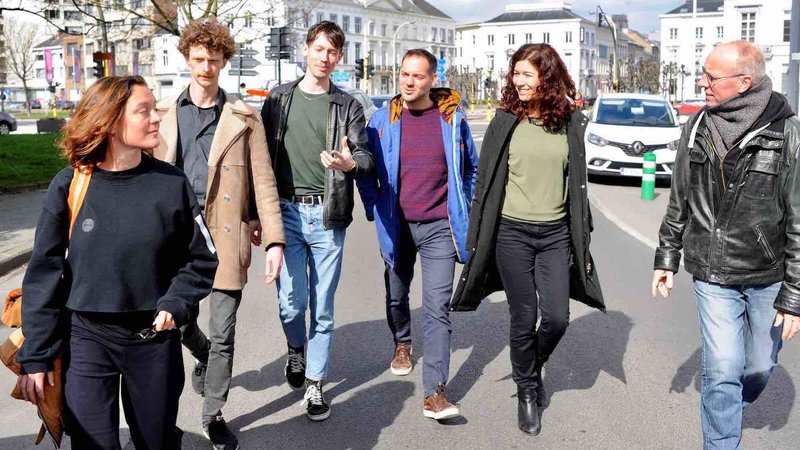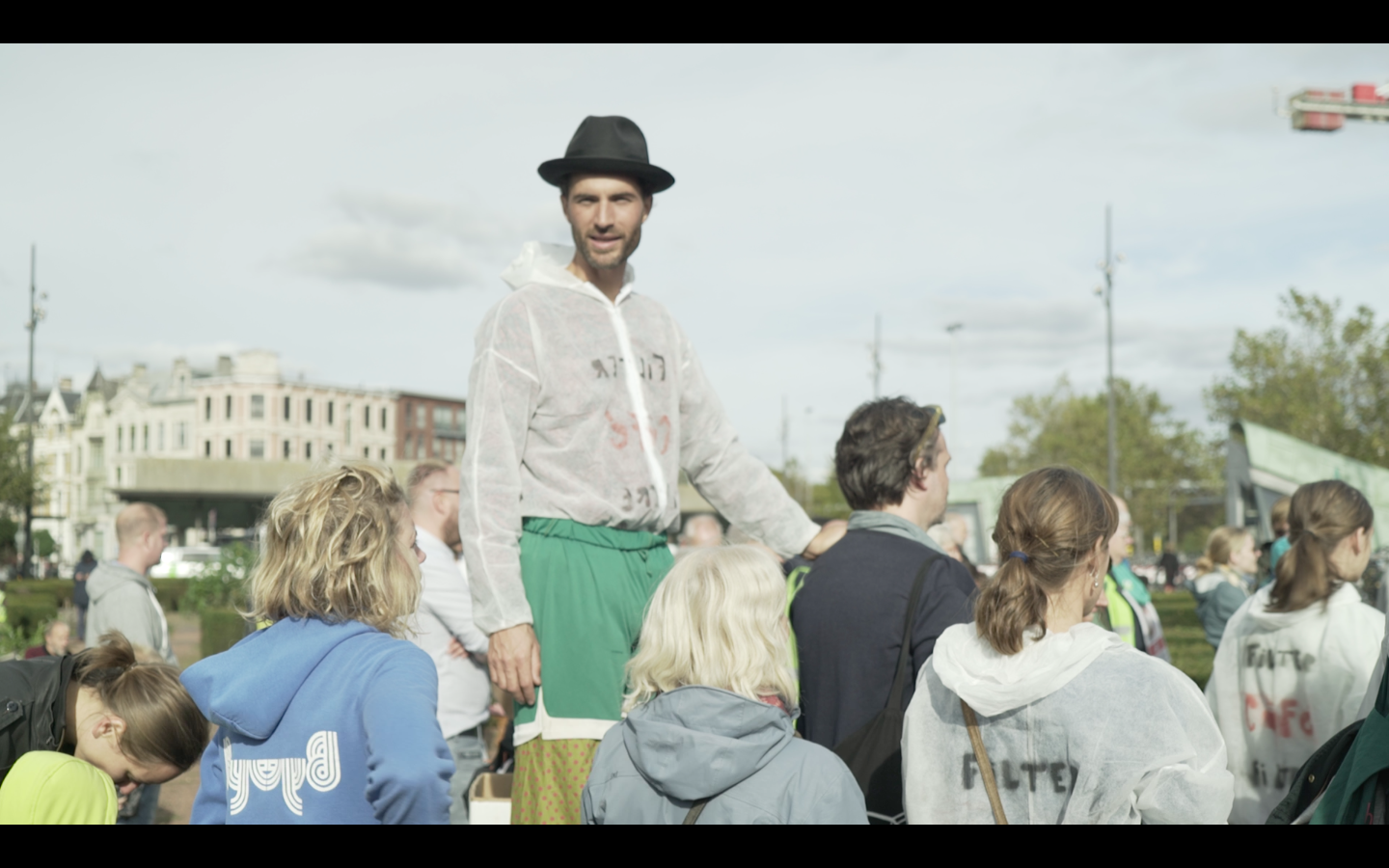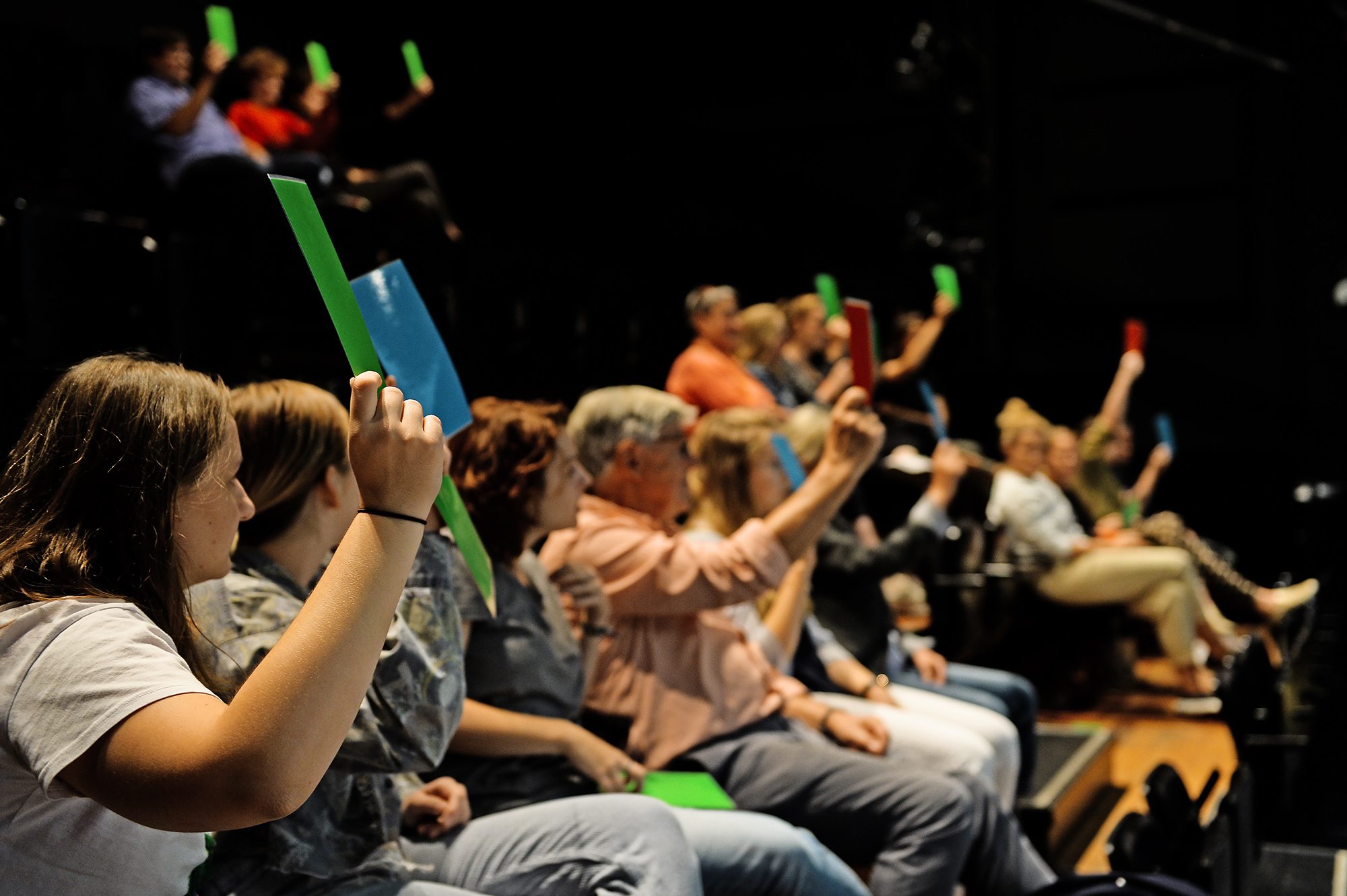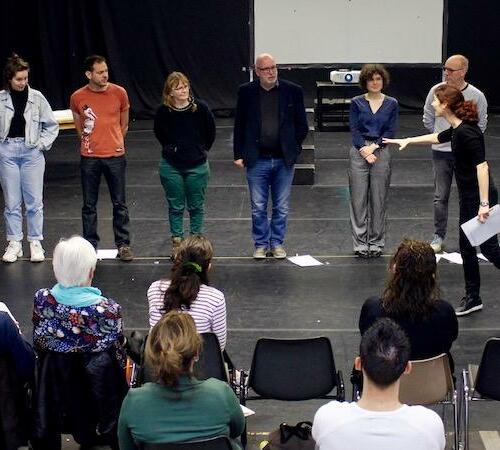 partners
partners
A continuous theatrical investigation into the future of democracy: Episode 2/3
Emma Lesuis & Jasper van den Berg
10/07/2019
For the IN SITU pilot project In Search of Democracy 3.0, Lucas de Man and his team of Stichting Nieuwe Helden work together with IN SITU partners to make an investigation of current democracy and its challenges for the future.
In this second episode, the team explains about the research they did to nourish the performance and the media project.
An ongoing research on democracy by Jasper van den Berg
I became involved in the project about a year ago as a researcher. The feeling that democracy was becoming an increasingly less popular form of government made my involvement feel urgent. Among young people you often hear calls for authoritarian leaders, as shown in the research by Yascha Mounk of Harvard University. Society is also changing rapidly in other areas. Look at how technology increasingly dictates how we live our lives, which in turn forms the basis for unrest. How do such conditions ensure an equal distribution of power? How do we guarantee this in the 21stcentury? Who are the thinkers, journalists, young people and leaders who are thinking about how to organise new ways of democracy? With these questions in mind, the idea of Democracy 3.0 was born: an upgrade. I am helping to collect the ideas that already exist throughout Europe, which we share in different ways. One is the documentary series that has been made by Emma Lesuis, in which we follow young people who are tinkering with democracy and have come up with new ideas and are putting them into practice. The other is the performance.
This performance is an interactive exploration which we use to enter into a conversation with the audience: what is democracy, where does it come from, how do we form it together, how do we address the audience as a co-actor? And above all: how will our democracy become future-proof?
During our research we discovered that the system is very old, and that it seems to be inherently human to engage in forms of democracy. You can see through history: those groups that manage to shape their mutual dependence according to democratic principles are flourishing societies. Between people, but also between people and nature. But with the ancient Greeks, slaves and foreigners and women were not allowed to participate. That was a primitive version of democracy. Then with the Enlightenment came the representative democracy of the 17thand 18th centuries. And yet this same Enlightenment also brought colonisation and racial doctrine. Something that strongly contradicts democratic principles.Since the introduction of universal suffrage in the Netherlands, no major constitutional amendment has been implemented in the parliamentary system. That was at the beginning of the 20thcentury. That means 100 years in which we have not seen any major democratic reform. We have seen the introduction of cars, smartphones, global capitalism and the European Union. Maybe this is something we should work on! Or maybe we should involve citizens better using new technology, or think about how we protect the local from the global. These are the starting points of our search. Who has ideas, who can do what?An important principle of democracy is the protection of minorities. But where are the LGBTQ+ rights in the Universal Declaration of Human Rights? Their inclusion is something the philosopher of law, Irena Rosenthal, from the University of Amsterdam, strongly advocates for. And, how do you ensure successful civic participation in cities? Manu Claeys developed the 'Octopus model' for relatively autonomous administrative tentacles throughout the city activated by citizens thinking and doing. Or, more abstract perhaps, how can we better listen to the voice of nature? This is, for example, a plea from the Embassy of the North Sea. Nature also has a voice and we have to listen to it more and more
We take a critical look at these kinds of insights. Which ideas will remain? What makes people enthusiastic? By discussing these questions, we hope that people will feel inspired to participate, to rebel and to organise.One of the goals of our project is that we as creators learn by doing, and by taking others along in our journey, we also teach them something. Democracy is a difficult subject to understand. It covers everything, and actually nothing. How can that be?
How do you get a story in which you can visualise democracy, in which people experience how powerful they are, and in which they understand its importance? How do you make democracy tangible?
I think that a theatrical form offers a new horizon for democracy, by presenting fantasy, storytelling, new narratives and entering into dialogue with people. Another insight is that as parliaments become more and more theatre, perhaps the theatre should become more and more parliament.I am hopeful and optimistic. I believe in the cooperation that people enter into with each other. Even though we live in the digital age, people still get energy from physically coming together. Democracy is also the gathering of bodies, which is in itself of course very theatrical – that’s one of the starting points of the performance. There are many challenges, things are going to change, including in the field of climate and technology. Yet you can see that a lot of energy is being released: a feeling that together we are really going to save democracy.I too wake up occasionally and see in the news that Brazil’s Bolsonaro is taking the rights away from minorities and then you think: wow, this is serious. You may have the feeling that the world is less your world, but that’s only an incentive to fight for it.
 © Emma Lesuis - Documentary Episode 3
© Emma Lesuis - Documentary Episode 3
Following changemakers who aim to reshape democracy by Emma Lesuis
For In Search of Democracy 3.0,I make short documentaries about democratic innovators. That is why I’m going into Europe. With these documentaries, I try to excite enthusiasm and energy from the viewer. But also, from myself. I always thought I live in a democracy, but I have less to do with politics. It was far away from me. This project has given me much more political awareness. At the same time, my original attitude is part of a bigger problem: people think that politics is outside of them. We are thoroughly involved with politics, but we don’t realise that enough. Actually as a citizen you can really do a lot.
With this documentary series, I hope to inspire people to get moving, to get out into the world. Not just going online or in opinion pieces.
In Belgium, I specifically looked at civic participation. This seems to me to be more present there. A large number of citizens were elected in the last municipal elections in Belgium and there are also a large number of active citizens' movements. In Ghent it worked like this: the municipality released €1.35 million to spend, and citizens could then vote for which projects that money would go to. In Ghent, the Geveltuinbrigade (Façade Garden Brigade) received money from the Ghent Environmental Front to plant the façades of the houses with gardens. The whole city is livened up with money from the citizens' budget. In Antwerp, for example, money goes to an art project that revolves around an empty pedestal, where new works of art can be displayed, instead of, for example, another statue of King Leopold II. In this way, the project seeks to start discussions about decolonisation - who do we worship as heroes, and shouldn't we simply have new people there?
What I have also seen is how complex democratic reform can sometimes be. We were in Iceland at the end of 2018, a country that is considered to be democratically innovative, including in the field of women's rights. Yet they have their problems there too. The fact is that people have written a new constitution together through a lottery and using social media, but it’s never been passed by parliament. Iceland is just a small country, with few inhabitants - and yet the power lies with a few people. And that’s hard to break through. We were there on 1 December, when the country celebrated its 100th anniversary as a sovereign state, separated from Denmark. There were celebrations, but also all kinds of protests. A hundred years ago, the Constitution was literally taken over from Denmark, while people now want a new, adapted version, one that suits the Icelandic situation. Drastic things need to be changed, but at the same time it turns out that it’s very difficult to vote people out of parliament. In addition to this whole situation, there was also a scandal. Some politicians had said very harsh things about other Members of Parliament, and that had been leaked and made public. The whole population was in turmoil; it was as if a bomb had exploded. In situations like this, resolute decisions and major changes are really difficult to implement.
The most shocking thing I experienced was when I travelled with Jasper to Belgrade. We were at a meeting of the European party, DiEM25, that was being founded. There were many progressive, left-wing young people there. I have to say that sometimes I’m afraid of what is happening in Europe, with right-wing populism. They are afraid of the Other, which sometimes simply translates into: 'people of colour have to leave'. I had hope in DiEM25 because it was partly set up by former Greek Minister for Economic Affairs, Yanis Varoufakis, and the Hungarian philosopher Srecko Horvat. When we got there, it turned out that everyone was white, even though they have a programme against racism. At a certain point, spokespersons had to be appointed per group. Only men were chosen. I thought: wow, this is supposed to be the European party fighting against fascism and racism. When I said something about it, I didn’t make myself very popular either. “We don't do identity politics”, they said.This strengthened my conviction that inclusiveness is incredibly important in any organisation. The downside is that when I returned to the Netherlands I thought: if they’re not doing it, then I should set it up myself!Anyway, I prefer to focus on the positive. Another good example of involvement I came across during filming is 'Flatpack democracy'. This is an idea that originated in the English town of Frome, where citizens represent themselves in local politics. For example, the baker comes to talk about the local importance of bakers. This idea, that entrepreneurs represent themselves, is gaining popularity elsewhere as well. It is also being experimented with in Antwerp.You can also see that many of the projects we pursue are imitated elsewhere. A woman involved in the citizens' budget project in Belgium told me that they talk with a lot of Dutch municipalities looking to see how they can implement this in their own places…
Follow the creation process of the project and watch the short documentaries on: https://insearchofdemocracy.com/
Stay tuned for the last episode, soon to be published on this blog!
Jasper van den Berg and Emma Lesuis are part of the team of Lucas de Man.
For In Search of Democracy 3.0, Jasper has done preliminary research on the concept of democracy and some initiatives in Europe. He has been involved in the production as well. Emma Lesuis is documentary- and theatre-maker. For the project, she has made a documentary series in which she has followed changemakers in their endeavor to reshape political decisionmaking by putting ideas about democracy into practice.The short documentaries made in the Netherlands, Belgium and Iceland can been watched on the online platform of the project.

